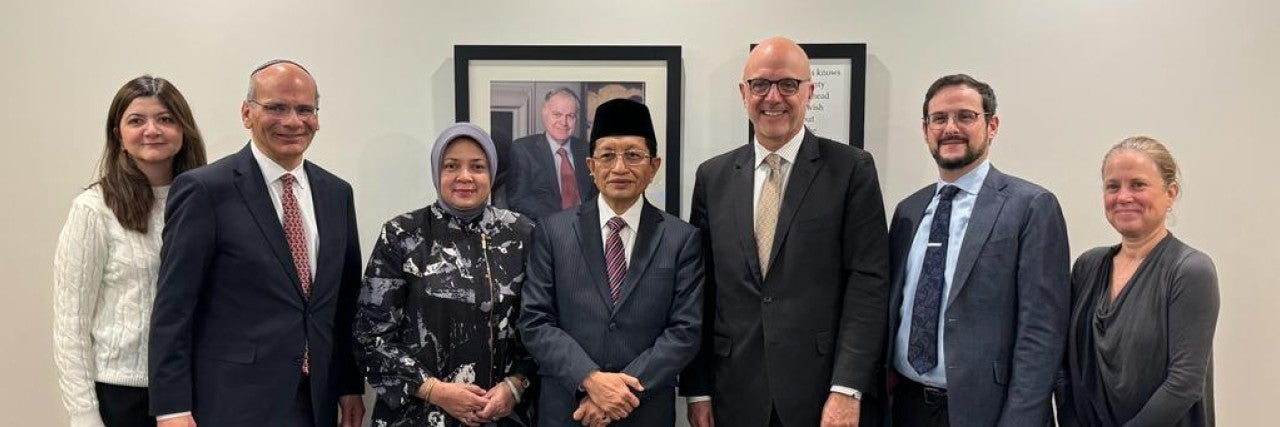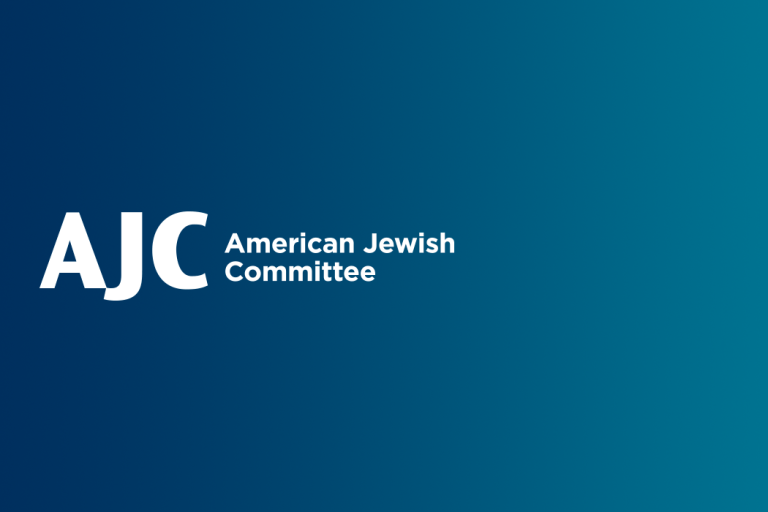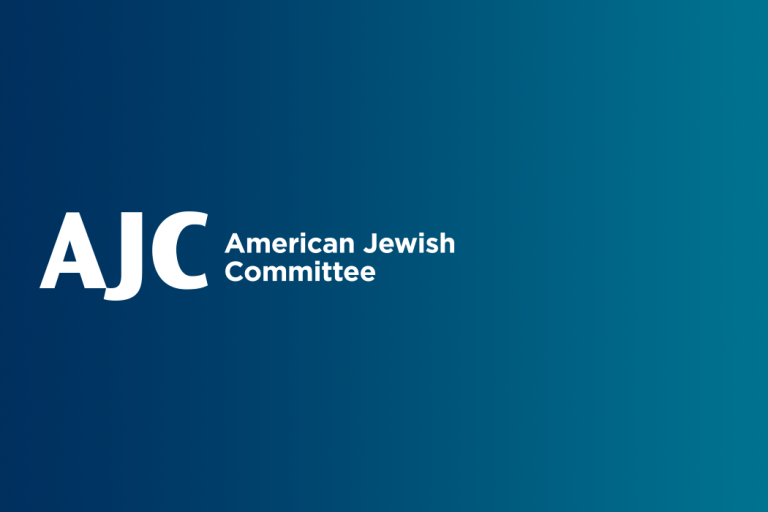March 1, 2024 — New York, NY
Professor Nasaruddin Umar, the Grand Imam of Masjid Istiqlal – Indonesia's national mosque and the largest mosque in Southeast Asia – recently completed a six-week intensive fellowship with American Jewish Committee (AJC) and the Jewish Theological Seminary (JTS). The fellowship included academic study, meetings with civil society leaders and government officials, and participation in interreligious dialogues across the United States.
“Indonesia is the largest Muslim country in the world, but most people have little or misinformed knowledge of Jews, despite the close links between Islam and Judaism,” said Imam Umar. “Building bridges of peace and understanding between religions and peoples starts with learning about the other on their own terms. I am grateful for the opportunity to study, build networks, and experience the 'living libraries' of New York City, Washington, D.C., and Los Angeles.”
The position of Grand Imam of Masjid Istiqlal is a presidential appointment and holds national significance in Indonesia. Under Imam Umar’s leadership, Indonesia’s national mosque has become a flagship institution promoting interfaith harmony, environmental sustainability, and religious scholarship with a global perspective. Indonesia is increasingly viewed by other countries and faith leaders— including across the Muslim world— as a model for open and constructive expression of religious thought and practice.
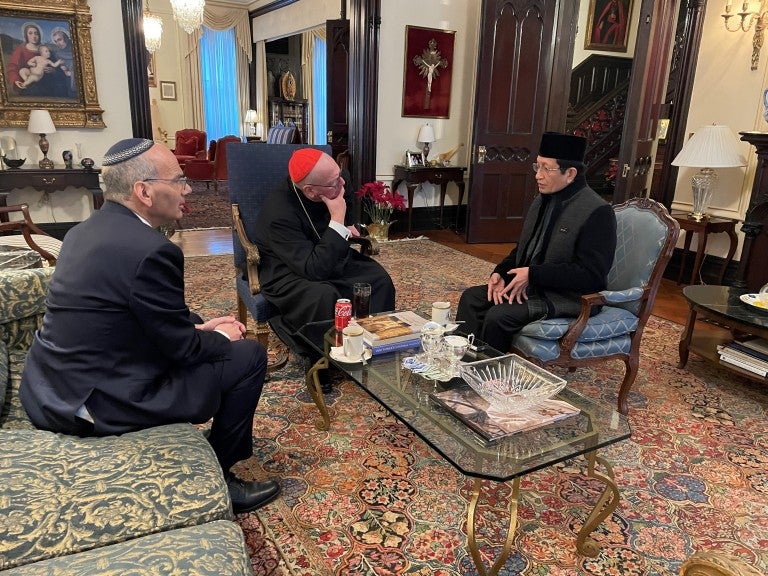
“The Imam has long demonstrated a commitment to interfaith dialogue and understanding, and we are inspired by his dedication to substantive engagement with Jews and Judaism,” said AJC CEO Ted Deutch. “At a time when it is all too easy to view global Muslim-Jewish relations through the lenses of conflict and animosity, the Imam's steadfast commitment to a different path—one rooted in cooperation, understanding, and peace—stands as a beacon of hope.”
AJC is a global leader in interfaith relations and its longstanding ties to Indonesia – built primarily through its Asia Pacific Institute (API) – include regular visits aimed at fostering relationships with a broad network of religious leaders, scholars, and political figures. Interreligious understanding has been a central goal of AJC’s efforts in the country and a prominent feature of its work with the Grand Imam.
In recent years, Imam Umar and Masjid Istiqlal have co-hosted several programs to foster greater cross-cultural religious literacy with the Jakarta-based Leimena Institute. These week-long virtual trainings for Indonesian educators feature a basic introduction to Judaism taught by AJC lecturers, alongside classes on Islam, Christianity, and intergroup collaboration. Likewise, in 2022 and 2023, Imam Umar welcomed AJC delegations to Masjid Istiqlal and featured AJC experts on panel programs about “Interfaith Education” and “Antisemitism and Islamophobia in the World Today.”
The AJC Fellowship in Judaism and Interreligious Understanding at the JTS Milstein Center for Interreligious Dialogue developed organically from growing trust between Imam Umar and AJC and a shared commitment to advance cooperation between Muslims and Jews around the world.
“Many in our communities think about Muslim-Jewish relations as a field focused solely on political outcomes or ceremonial gestures,” said Rabbi Burton Visotzky, PhD, Director of the Milstein Center for Interreligious Dialogue at JTS. “In fact, deep learning about the other and serious comparative scholarship, like that of Imam Umar’s fellowship, are key to transforming an interreligious relationship from superficial to sustainable, from transactional to trusting.”
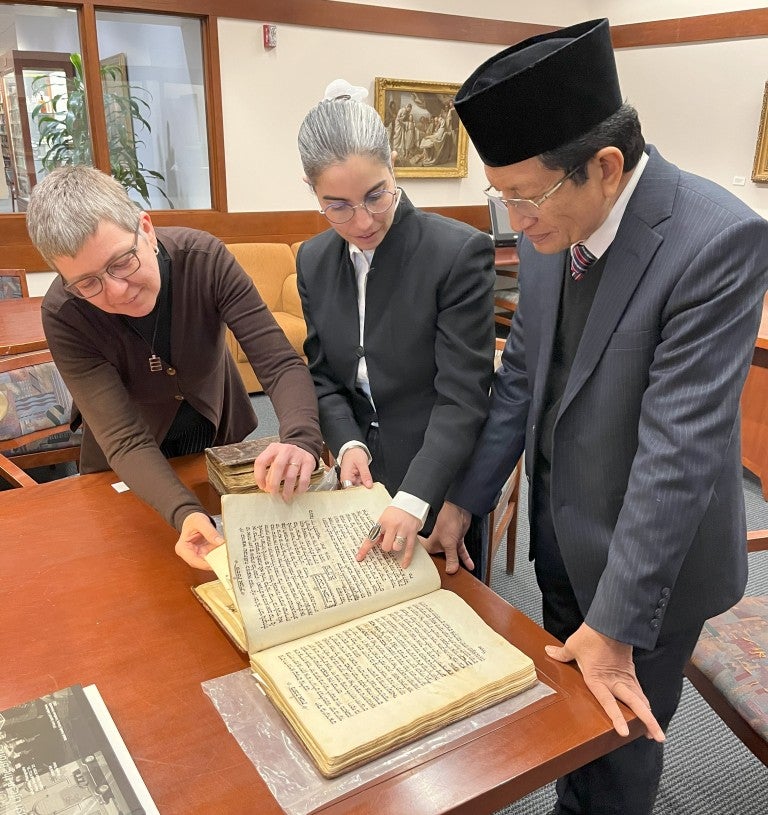
Over the course of his six weeks in the U.S., the Imam’s program was anchored in foundational academic study of Judaism and Jews. His fellowship also included visits to dozens of synagogues and Jewish educational institutions, where he explored diverse approaches to Jewish learning and spiritual life. Throughout these experiences, the Imam engaged with Orthodox, Conservative, Reform, and non-denominational communities, as well as Ashkenazi, Sephardic, and Mizrahi Jews, representing both liberal and conservative American Jewish perspectives.
Interreligious dialogue was also a major feature of the AJC Fellowship. In addition to encounters with Jewish communities, Imam Umar participated in substantive exchanges with academic and religious leaders from Christian, Muslim, and other faith traditions. Among others, he met with Cardinal Timothy Dolan and Archbishop José Gomez, heads of the Archdioceses of New York and Los Angeles, respectively; Reverend Randolph Hollerith, Dean of the Washington National Cathedral; and Imam Talib Shareef, President of Masjid Muhammad, the Nation’s Mosque.
He also conducted site visits and dialogues at major civic institutions, including the Center for Jewish History, the New York Public Library, the Skirball Cultural Center, and the U.S. Holocaust Memorial Museum.
The Fellowship was an opportunity to advance the goals of religious freedom, as well. At meetings with United Nations officials – including with the High Representative for the Alliance of Civilizations Miguel Moratinos and Special Adviser to the Secretary-General for the Prevention of Genocide Alice Nderitu – Imam Umar championed the unique role that religious leaders in Indonesia and around the world can play to bridge between cultures and counter hate and extremism.
Likewise, in Washington D.C., Imam Umar and AJC promoted the importance of religious diplomacy in the 21st century, highlighting how interreligious ties strengthen democratic values. Several intense days of meetings included productive discussions with U.S. Ambassador for International Religious Freedom Rashad Hussain, U.S. Special Envoy to Monitor and Combat Antisemitism Ambassador Deborah Lipstadt, and a roundtable hosted by the U.S. Institute of Peace.
In addition to his role as spiritual head of Masjid Istiqlal, a congregation which sees hundreds of thousands of worshippers and visitors each week, Imam Umar also serves as the rector of a college of Qur’anic studies (PTIQ) and as chair of Pesantren As’adiyah, a network of Islamic boarding schools with several hundred branches across Indonesia. He also holds a full professorship in Islamic studies at Syarif Hidayatullah State Islamic University of Jakarta and previously served as Vice Minister for Religious Affairs of Indonesia. Despite the many prominent positions he occupies, when asked about himself and how he made time for the AJC Fellowship at JTS, Imam Umar displays admirable humility.
“I am a student my whole life, which may be why I always find myself surrounded by teachers and scholars. Whether we are Muslim or hold other beliefs, we all have a responsibility to seek out knowledge beyond our own tradition– this is the only way to rebuild the world on a foundation of mutual respect,” said Imam Umar.
AJC is the global advocacy organization for the Jewish people. With headquarters in New York, 25 offices across the United States, 14 overseas posts, as well as partnerships with 38 Jewish community organizations worldwide, AJC’s mission is to enhance the well-being of the Jewish people and Israel and to advance human rights and democratic values in the United States and around the world. For more, please visit www.ajc.org
###
Banner photo: Grand Imam Nasaruddin Umar meets with AJC CEO Ted Deutch and staff of AJC Interreligious Affairs and AJC Asia Pacific Institute.
